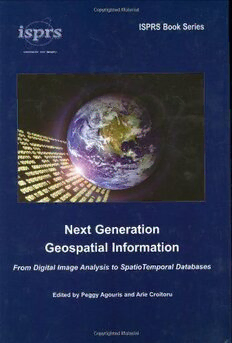
Next Generation Geospatial Information From Digital Image Analysis to Spatiotemporal Databases PDF
246 Pages·2005·4.141 MB·English
Most books are stored in the elastic cloud where traffic is expensive. For this reason, we have a limit on daily download.
Preview Next Generation Geospatial Information From Digital Image Analysis to Spatiotemporal Databases
Description:
With the turn of the century our ability to collect and store geospatial information has increased considerably. This has resulted in ever-increasing amounts of heterogeneous geospatial data, an issue that poses new challenges and opportunities. As these rich sources of data are made available, users rely, now more than ever, on the geospatial data infrastructure. The availability and accessibility of such data, as well as the ability to effectively manage, model, index and query the data is becoming a cornerstone in numerous applications. Moreover, the ability to formalize and represent data is becoming key to integration and interoperability. With the introduction of distributed geospatial data infrastructure and the implementation of web-based services, the impact of such issues is becoming even more evident. Inspired by these challenges, this book on Next Generation Geospatial Information offers a collection of original contributions from leading experts in spatial information modeling, image processing and analysis, database management, ontologies and data mining. It provides a unique insight into the current state-of-the-art and future challenges in geospatial information through four thematic chapters, each of which represents a primary research theme, namely distributed spatial infrastructure, image-based geospatial information management, indexing and querying geospatial databases, and ontology and semantics for geospatial data.
See more
The list of books you might like
Most books are stored in the elastic cloud where traffic is expensive. For this reason, we have a limit on daily download.
